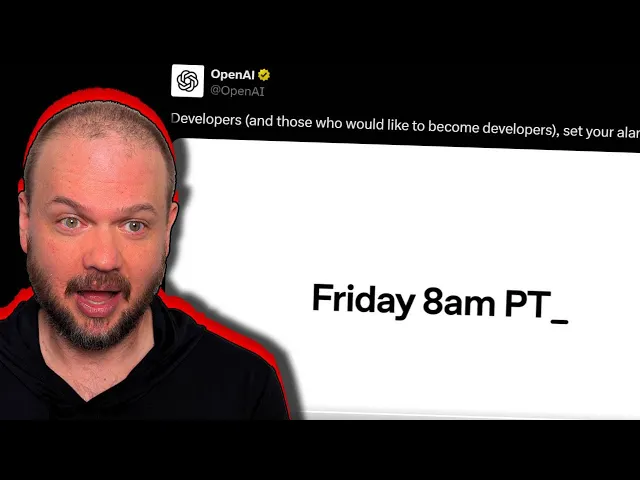[OpenAI Livestream] developers (bring coffee)

OpenAI's dev tools reshape AI customization
OpenAI's developer livestream represents a significant shift in how organizations can build and customize AI solutions without requiring deep technical expertise. The company unveiled several developer tools that lower the barrier to entry for AI implementation while providing sophisticated capabilities that will appeal to seasoned developers. As enterprises increasingly look to integrate AI into their operations, these announcements signal a maturation in how AI platforms are meeting businesses where they are—regardless of technical sophistication or development resources.
The livestream, billed as a developer-focused event (with a humorous "bring coffee" advisory), revealed OpenAI's strategic direction in empowering both technical and non-technical teams to build customized AI solutions. The presentation featured several key product announcements and demonstrations, highlighting new APIs, integration capabilities, and custom model development features that collectively aim to make AI development more accessible, efficient, and customizable.
-
Assistants API updates introduce more sophisticated capabilities for developers building AI applications, including the ability to create persistent AI assistants that can process instructions, access knowledge, use tools, and maintain conversation context—streamlining the development of complex AI applications.
-
New GPT Builder tools democratize custom AI model creation by allowing users to design specialized GPTs through natural language instructions and real-time feedback, effectively removing coding requirements from the customization process.
-
Vision capabilities expand across the platform, letting developers integrate image understanding into various applications and enabling models to "see" and intelligently interact with visual content.
-
The Context Window expansion to 128K tokens significantly increases the amount of information models can process at once, addressing previous limitations in handling lengthy documents or complex datasets.
-
Function calling enhancements provide developers with more control over how AI models interact with external tools and APIs, creating more reliable and predictable AI systems.
Perhaps the most significant development is OpenAI's shift toward accessibility in AI development. The new GPT Builder tool fundamentally changes who can create custom AI solutions. This is revolutionary because it effectively removes the technical barrier that has historically limited AI customization to organizations with specialized ML teams. Now, domain experts across industries can directly translate their knowledge into customized AI capabilities without intermediaries.
This matters tremendously in the current business landscape where AI adoption is no longer optional but essential for competitive advantage. By democratizing development, OpenA
Recent Videos
How To Earn MONEY With Images (No Bullsh*t)
Smart earnings from your image collection In today's digital economy, passive income streams have become increasingly accessible to creators with various skill sets. A recent YouTube video cuts through the hype to explore legitimate ways photographers, designers, and even casual smartphone users can monetize their image collections. The strategies outlined don't rely on unrealistic promises or complicated schemes—instead, they focus on established marketplaces with proven revenue potential for image creators. Key Points Stock photography platforms like Shutterstock, Adobe Stock, and Getty Images remain viable income sources when you understand their specific requirements and optimize your submissions accordingly. Specialized marketplaces focusing...
Oct 3, 2025New SHAPE SHIFTING AI Robot Is Freaking People Out
Liquid robots will change everything In the quiet labs of Carnegie Mellon University, scientists have created something that feels plucked from science fiction—a magnetic slime robot that can transform between liquid and solid states, slipping through tight spaces before reassembling on the other side. This technology, showcased in a recent YouTube video, represents a significant leap beyond traditional robotics into a realm where machines mimic not just animal movements, but their fundamental physical properties. While the internet might be buzzing with dystopian concerns about "shape-shifting terminators," the reality offers far more promising applications that could revolutionize medicine, rescue operations, and...
Oct 3, 2025How To Do Homeless AI Tiktok Trend (Tiktok Homeless AI Tutorial)
AI homeless trend raises ethical concerns In an era where social media trends evolve faster than we can comprehend them, TikTok's "homeless AI" trend has sparked both creative engagement and serious ethical questions. The trend, which involves using AI to transform ordinary photos into images depicting homelessness, has rapidly gained traction across the platform, with creators eagerly jumping on board to showcase their digital transformations. While the technical process is relatively straightforward, the implications of digitally "becoming homeless" for entertainment deserve careful consideration. The video tutorial provides a step-by-step guide on creating these AI-generated images, explaining how users can transform...
